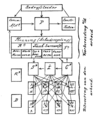Scientific management
Scientific management, also called Taylorism, was a theory of management that analyzed and synthesized workflows. Its main objective was improving economic efficiency, especially labor productivity. It was one of the earliest attempts to apply science to the engineering of processes and to management. Its development began with Frederick Winslow Taylor in the 1880s and 1890s within the manufacturing industries. Its peak of influence came in the 1910s; by the 1920s, it was still influential but had begun an era of competition and syncretism with opposing or complementary ideas.
People[edit]
Taylor[edit]
-
Taylor, 1873
-
Taylor, 1886
-
Taylor, 1895-1900
-
Taylor, 1911
Other people[edit]
In the article series "The Gospel of Efficiency" in The American Magazine from March-May 1911, Taylor presented about a dozen foreman of scientific management (with image), In the following gallery they are marked with asterisk (*):
-
Carl G. Barth (*)
-
Charles Day (*)
-
Henry Gantt (*)
-
Henry P. Kendall (*)
Tools[edit]
-
Time and motion study
-
Slide rule for turning work
-
Planning department bulletin board
-
Flow charting
-
Gantt chart
-
Record of efficiency and costs
Places[edit]
-
Midvale Steel Works Aerial View, 1879
-
Midvale Steel and Ordnance Company
-
Bethlehem Steel plant, 1896
-
Tabor Company, a firm where Frederick Taylor's consultancy was applied to practice, about 1905
-
Santa Fe shop, Topeka Kansas
-
Frank Bunker Gilbreth, ca. 1916
See also[edit]






























